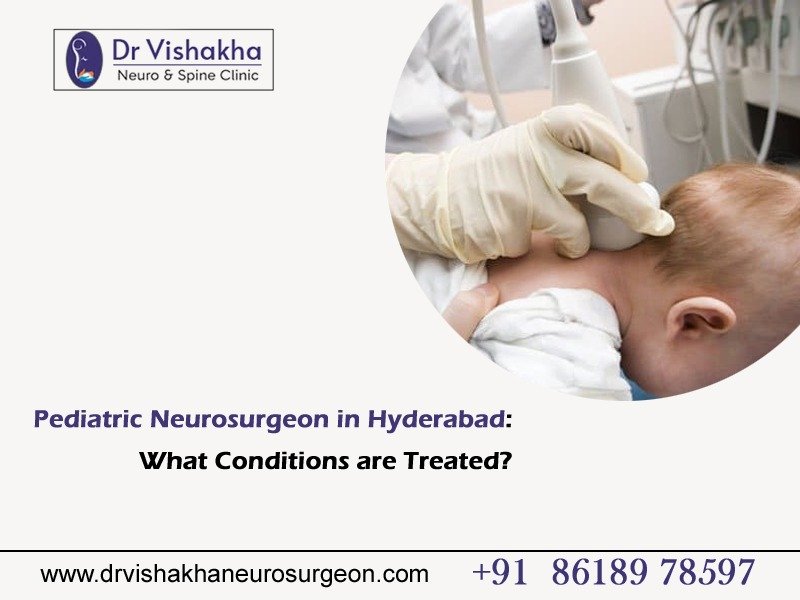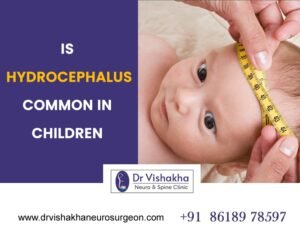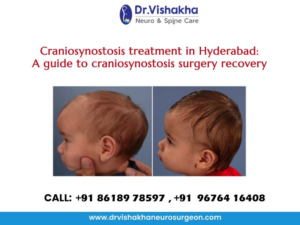Hyderabad, known for its cultural heritage and technological advancements, is a hub for medical excellence, including paediatric neurosurgery. Paediatric neurosurgeons provide advanced surgical care with compassion to the children with neurological disorders, using their expertise, state-of-the-art facilities, and multidisciplinary approach. They treat a wide range of complex disorders, including brain tumours, hydrocephalus, spina bifida ( spinal dysraphisms), craniosynostosis and more. The collaborative approach involves pediatric neurologists, neuroradiologists, paediatricians, oncologists, and rehabilitation specialists providing personalised, holistic care.
Paediatric neurosurgeons specialisations:
Neurosurgery may be necessary for children due to their unique conditions and medical requirements.
- Brain tumours: Brain tumours, both benign and malignant, can originate from various brain regions and cause varying symptoms based on their location and size.
- Hydrocephalus: Blockage of fluid flow or overproduction of cerebrospinal fluid can result in excess cerebrospinal fluid collecting in the brain, leading to raised pressure in the brain.
- Spina Bifida (Spinal dysraphism) : Spinal dysraphism is a fetal neural tube defect due to improper spinal column closure during baby’s development in the womb. It might lead to paralysis in both limbs, bowel and bladder dysfunction, and neurological complications.
- Chiari malformation: A structural defect in the skull and cerebellum, extending into the spinal canal, can cause headaches, neck pain, and balance issues.
- Craniosynostosis: Premature fusion of cranial sutures can cause abnormal skull shape and restricted brain growth and increased pressure, necessitating surgical correction for normal brain development.
- Epilepsy: Children with epilepsy may require neurosurgical intervention if their seizures don’t respond to medication, which may involve removal of some part of brain or disconnection or seizure control devices.
- Traumatic brain injury (TBI) or spine injury : Severe head injuries from accidents or trauma may require neurosurgical intervention to remove blood clots, repair damaged tissue or bone, or relieve intracranial pressure.
- Tethered cord syndrome: Abnormal spinal cord attachment can cause neurological symptoms, necessitating surgery to release the tethered cord and prevent further complications.
- Spinal cord Tumors: Tumours affecting the spinal cord can cause back pain, weakness, and sensory deficits, potentially necessitating surgical removal to alleviate pressure on the spinal cord and nerves.
- Vascular malformations: Neurosurgery may be necessary to treat abnormalities in brain or spinal cord blood vessels, such as arteriovenous or cavernous malformations, to prevent bleeding or alleviate symptoms.
Neurosurgical intervention in children may be necessary, and a decision must be made collaboratively by parents, paediatric neurosurgeons and healthcare team members, considering risks, benefits, and overall health.
The recovery period following a Pediatric Neurosurgery
A child’s recovery period after neurosurgery can vary greatly depending on various factors, including the kind and complexity of the operation, the underlying ailment being treated, the child’s age and overall health, and any problems that may occur during or after the treatment.
Immediate postoperative period:
- After neurosurgery, the child typically spends time in the recovery room under close healthcare professional monitoring.
- The initial recovery period for a child can range from several hours to a day, depending on the child’s condition and the extent of the surgery.
Hospital stay:
- The child’s initial recovery period can range from several hours to a day, depending on their condition and the extent of the surgery.
- The child will be closely monitored for signs of complications, and appropriate pain management and rehabilitation therapies may be initiated as needed.
Recovery at home:
- After hospital discharge, the child will continue to recover at home under the care of caregivers and healthcare providers.
- The recovery period at home can significantly differ based on the specific surgery and the child’s unique requirements.
- Some children may require continuous rehabilitation therapy, medication management, or specialised home care.
Return to normal activities:
- The child’s recovery progress and the nature of the surgery will determine the timeline for returning to normal activities.
- Children may resume normal activities quickly, but some may need a gradual return, especially if the surgery involves significant physical or neurological impacts.
Long-term follow-up:
- Neurosurgery children may require long-term follow-up care to monitor progress, manage symptoms, and address developmental or functional concerns post-surgery.
The prognosis for paediatric neurosurgeons:
- Condition-specific factors: The prognosis of a neurological condition depends on its underlying cause, with some conditions like brain tumours or hydrocephalus potentially having favourable outcomes. In contrast, others, like severe injuries or complex anomalies, have more uncertain outcomes.
- Effectiveness of treatment: The prognosis of paediatric neurosurgery depends surgical intervention effectiveness , surgical skills and use of newer advanced gadgets to improve safety of surgery. Success rate of surgery has improved due to advancements in techniques, tools and care.
- Complications and risks: Paediatric neurosurgery involves risks like
- Infection
- Bleeding
- Neurological deficits
- Adverse anaesthesia reactions
- Neuroplasticity and rehabilitation: Neuroplasticity in children’s brains aids in recovery and adaptation after neurosurgical procedures, with rehabilitation therapies like physical, occupational, speech, and cognitive therapy maximising functional outcomes and quality of life.
- Long-term follow-up: Paediatric neurosurgical conditions necessitate long-term monitoring and follow-up care to assess progress, detect recurrence, and address ongoing neurological needs. Regular appointments with neurosurgeons and other healthcare providers optimise long-term outcomes.
Paediatric neurosurgery has seen an improved prognosis due to advancements in medical technology, surgical techniques, and multidisciplinary care approaches. However, each case presents unique challenges, and open communication between healthcare providers, patients, and families is crucial for achieving the best possible prognosis for paediatric neurosurgery patients.
Paediatric neurosurgeons in Hyderabad are renowned for their expertise in treating complex brain and spinal disorders in children. They handle a range of conditions, including congenital anomalies, traumatic injuries, tumours, and epilepsy.
Dr Vishakha Basavraj Karpe, a senior consultant at Rainbow Children’s Hospital in Banjara Hills, is known for her comprehensive care approach and is one of the few dedicated paediatric neurosurgeons in the city. Her expertise includes treating hydrocephalus, spinal dysraphism, craniosynostosis, paediatric brain infections, and brain tumors.
About Dr Vishakha
Dr. Vishakha Karpe, a highly skilled Senior Paediatric Neurosurgeon at Rainbow Children’s Hospital, Banjara Hills, and Hyder Nagar in Hyderabad, is one of India’s leading paediatric neurosurgeons with extensive experience in paediatric neurosurgery. With over ten years of dedicated practice, she is among the few in India working extensively in this field.
With extensive experience in paediatric neurosurgical conditions, she focuses on comprehensive care, including precise surgery and educating parents about the complete case management protocol. She is an efficient and passionate medical professional, pursuing ethical practice and ensuring patient care after surgery.
Proficiency of Dr Vishakha:
-
- Hydrocephalus (increased fluid in the brain): The procedure involves an endoscopic third ventriculostomy and CSF diversion (VP shunt) to treat complex hydrocephalus.
- Craniosynostosis (abnormal head shape due to untimely cranial sutures fusion) surgeries: Helmet therapy is a technique that is used in both endoscopic and open surgery.
- Spinal dysraphisms(Spina Bifida)- (spinal abnormalities present by birth) – surgical repair
- Encepahaocles repair surgery.
-
- Vascular conditions and stroke surgeries: revascularization surgeries for moya moya disease.
- Pediatric brain and spine tumour surgeries.
-
- Pediatric brain and spine infection surgeries: Endoscopic and open surgeries for brain and spine infections.
- Pediatric traumatic brain and spinal injury.
- Antenatal counselling for congenital fatal neurosurgical conditions.
Dr Vishakha Karpe has special interest in craniosynostosis surgery, which is only done in a few centres in India. She is well qualified with M.B.B.S, DNB (surg), M.Ch (IPGMER SSKM) and became a Member of “The Royal College of Surgeons, Edinburgh” (U.K.). She is a highly successful and best paediatric neurosurgeon in Hyderabad, Telangana with 13 years of experience, is among the topmost paediatric neurosurgeons in the Rainbow group of hospitals at Banjara Hills and Hyder Nagar.





